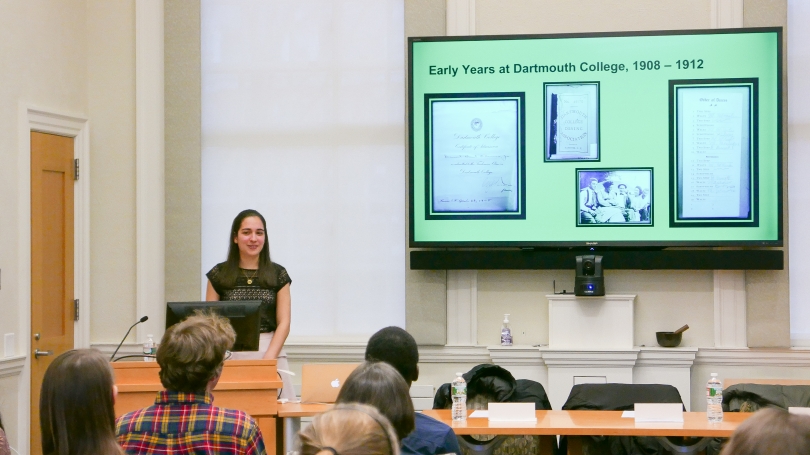
- About
- Consultation
- Programs
- Resources
- News & Events
Back to Top Nav
Back to Top Nav
Back to Top Nav
Julia Marino ’17 is learning what it means to be a historian. Thanks to the Penelope W. and E. Roe Stamps IV Leadership Scholar Award, the history major has traveled to archives across the country collecting thousands of pages of research about Basil O’Connor, Dartmouth Class of 1912. She hopes to one day turn what is now a 200-page thesis project into a published biography about O’Connor, an advisor to President Franklin D. Roosevelt and a philanthropic leader in the effort to end polio during the mid-1900s.
“The funding from Stamps Scholars will allow me to engage further in the activities that are at the center of the life of a historian: traveling to archives, meeting with other scholars, and participating in academic conferences,” says Marino. “Through my research trips, I will trace O’Connor’s life path and piece together his story.”
Marino’s hope is that she will be able to draw “larger conclusions about what O’Connor, Roosevelt, and the crusade against polio reveal about health care delivery and research, the power of the presidency, and grassroots mobilization around a cause.”
Marino, a New York native, recently spoke to the Web Services Content Corps Team about her project.
Where and with whom have you conducted your research?
I have traveled extensively to gather archival material for my research. I have visited the March of Dimes archives in White Plains, N.Y., the Franklin D. Roosevelt Presidential Library in Hyde Park, N.Y., and the Social Welfare History Archives in Minneapolis, Minn. The Rauner Special Collections Library also houses seven boxes of O’Connor material. I have taken pictures and organized on my computer over 5,000 pages of primary sources. With funding from the Stamps Scholars, I plan to travel extensively to archives around the country. I have planned trips to Minneapolis, San Diego, Cincinnati, Hyde Park, New Haven, Albany, White Plains, Warm Springs, Ga., and Tuskegee, Ala. I plan to gather and compile all the papers that I can find related to O'Connor's career.
Why does your project matter? How can others benefit from your research?
O’Connor served society in a tremendous way and I feel his story and his contributions have been lost. We’ve forgotten today how scary and life threatening polio was in the U.S. It was affecting children and had instilled a huge fear among the American people. Yet somehow, O’Connor managed to get every walk of life to donate. He led a movement for better health care for America and brought the country together. By studying him, his work ethic, and his story, we can reveal how non-profit organizations provide health care adequately.
Have there been instances in which you were able to bring what you learned outside of the classroom, into the classroom?
Definitely. This whole process of research is helping me grow as a historian. I can write research papers much more comfortably. I feel comfortable in an archive. I have learned to synthesize large amounts of material into a coherent whole—to take the most important historical information out. It has helped me grow as a thinker and as a person.
My faculty mentor is Professor Annelise Orleck, who I have also worked with on an independent study. Also, with Professor Balmer, I am studying O’Connors involvement in the National Conference of Christians and Jews during World War II.
I have caught the attention of a finalist for the Pulitzer Prize and I will potentially be working with him as a research assistant.
What are your plans for after graduation?
I’d like to work at Dartmouth for a bit, in an administrative office position. I'm really interested in the new residential system on campus. Afterwards, I’d like to go to graduate school, get a PhD, and become a professor.
The Penelope W. and E. Roe Stamps IV Leadership Scholar Awards provide undergraduate students an opportunity to create and pursue their own experiential learning project. Each Stamps Scholar receives up to $10,000 over the course of their final two years at Dartmouth. Half of the funds come from Dartmouth, the other half from the Stamps Foundation.